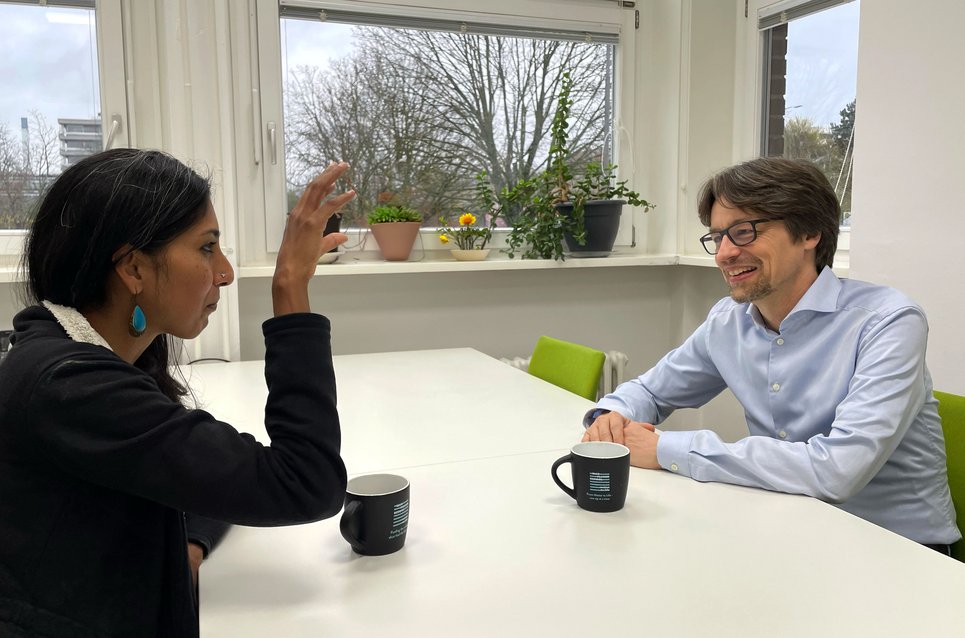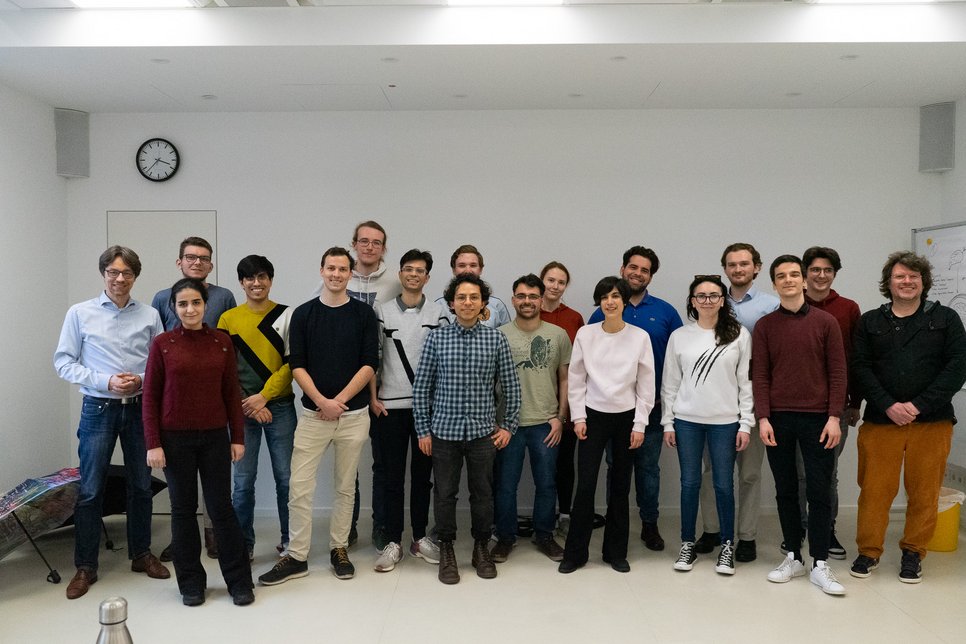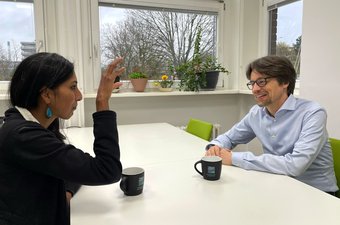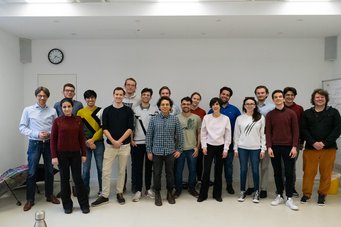“Life is something that we participate in, unlike matter”
An interview with Thorsten Moos from the Faculty of Theology at Heidelberg University
Earlier in March our first year PhD candidates participated in the Ethics Course, an integral part of their core curriculum. It was taught by Prof. Thorsten Moos, who recently joined the Matter to Life family as a faculty fellow. Matter to Life coordinator Dharanija Madhavan sat down with him to discuss about the definition and scope of ethics, and how you could actively engage the scientific community and especially those in the cusp of their scientific career with this topic. Read the interview to find the origin story of Prof. Moos, his take on the interplay of science and theology, role of AI in the future of ethics, and his impression on the Matter to Life program.

You have a unique background, having majored in Physics and then pursuing a PhD in theology. What prompted or inspired you to make this change?
I would like to tell you a dramatic story about an exciting single moment of epiphany and transformation, but that wasn't the case. As a teenager I was interested in both subjects. After some pondering, I decided to study theoretical physics assuming it to offer more freedom with regard to professional opportunities. I really loved it and still love to solve formal problems. Nonetheless, near the end of my studies, I started exploring and contemplating ethical issues. In an interdisciplinary seminar, I met bright people who were studying theology. I came to see it as a challenging intellectual undertaking. Having completed my diploma in theoretical physics, I granted myself two semesters of theology. After that year, I decided to stay in this path. I proceeded with my doctorate and ‘habilitation’ in theological ethics. That has brought me here.
How does your background in physics help you in teaching our students and connecting or collaborating with the other faculty fellows?
My knowledge of physics is from the 1990s, while I was a student. I still like reading about contemporary physics, more from the perspective of a layman. My experience concerning the internal dynamics and the logic of science and scientific discourse however still remains relevant. In the Matter to life context, even if I do not grasp every detail, I still understand what drives the students as scientists and I'm innately interested in what they are doing scientifically. This definitely helps me to see links between their work and ethical questions. I think my biographical experience with the sciences helps me to connect and facilitate a deeper level of exchange with students and faculty. I do not have the hang-ups prevalent among some colleagues in the humanities who do not regard science as intellectually significant. It is an interesting albeit uncomfortable place, straddling the two worlds; my double background definitely helps bridge the gap.
How do you reconcile theology with science? Do you view them as compatible or as antithetical?
To be honest, I do not try to reconcile the two. When you approach a question in a broad sense, answers from theology and science might appear contradictory. For example, with respect to the question of the origin of life, theology might seem to state that “God created it” while science explains it as the result of a series of improbable events. However, if you formulate the same question precisely, you either have a scientific question (concerning observations and laws) or a theological one (concerning experiences and meanings). My first attempt to write a dissertation was on the debate on quantum mechanics between philosophy and theology on one hand, and physics on the other. I wanted to understand why people try to fill theological or philosophical gaps with physical knowledge. To me, none of these attempts has ever been convincing; it is only of historical interest. When you do not have a common question or deal with a topic from different perspectives, there is no conflict and therefore no need for reconciliation.
When it comes to the subject of humans, you can also have such different perspectives. You can describe it from physical standpoint as an agglomeration of particles with a certain mass, or similarly in chemical or biological terms. In contrast, you can interrogate a human as a person with an existential relation to her- or himself and to the world, and as a religious subject. Now we have social phenomena where they all come together. Illness and the experience of it, a topic on which I elaborated in my habilitation, is an example. A somatic illness has its manifestation in a body, but the biography of the afflicted person renders existential, ethical and probably religious questions that are equally pertinent and complete the picture. Thus, ethical questions bring the perspectives together; and the challenge is not to reconcile, but to relate the perspectives in a meaningful way.
What are your first impressions of the study program and of the Matter to Life Community?

I must admit that I'm quite impressed by what I've experienced in the my conversations during the ethics course. I met a group of young people who are highly interested and engaged, dedicated to not only scientific issues, but also pondering seriously on their ethical ramifications. We read difficult texts, for example an original text by the philosopher Immanuel Kant (an English translation, of course), and dissected it. I really was impressed by how deep the students got into them, how lively the ensuing discussions were, and how competent the students were to link it to their own ideas, concepts and scientific existence. It is a great experience to have people from all over the world coming here and working together on such difficult issues.
Another exciting experience for me is the variety of disciplinary contexts the students come from. In the first session, we set up a “line of expertise” between the poles of “matter” and “life” and asked the students to place themselves in this continuum according to their research fields and interests. This assignment led to some interesting negotiations and reflections that we could later call upon for discussion on ethical issues.
When do you think the subject of ethics should be introduced to the students? As early as possible or after they've had some research experience, so that they can actually connect what you're teaching to real world instances?
I have given this some thought. Currently, the ethics course is taught relatively at the beginning of the program, since the students have only completed one semester. At this moment, they have already developed some ideas on which research field to specialize in, and also reflect on what kind of researcher they want to be. At the same time, they still have fresh impressions and questions about the interplay of science and society. Thus, I'm convinced that this is the perfect timing. In today's situation we need scientists who consider ethics as an integral part of their research, and not just as another bureaucratic hurdle that pops up when applying for the ethics approval, forcing them to formulate some standard sentences in a strange foreign language. With this course, they will be equipped with concepts, ideas and tools for reflecting on their research and its relevance to and impact on society from an ethical angle. If, at some stage of their career, they do encounter ethically challenging issues, they will hopefully be able to recall the lessons learnt.
This is even more important due to the fact that in the context of scientific research and technological innovation, ethics often comes downstream and tries to only prevent the worst consequences of applied technologies after they appear on the market. However, development in biotechnologies in the last decades has demonstrated that we need awareness of possibly relevant societal issues at earlier stages: in science itself, but also in society. Dual use problems are a classic example where we need scientists who are aware of the unintended consequences during the course of research, and not post factum. They should be able to communicate their perceptions and possible reservations, in order to have an open discourse within and between different disciplines of science. Another important avenue where ethics comes into play is the relation between science and society in general, since contemporary science is heavily dependent on the public trusting it. During the pandemic, we experienced what happens when this trust decays. This is why I consider it as a part of scientist’s professionality to possess and provide ethical awareness. Starting the students’ ethical training early encourages them to think along these lines. A follow-up refresher course or workshop would definitely contribute to reinforce their competences and commitment to this field.
How do you teach something subjective to scientists who are taught to prize objectivity?
First it is important to stress that ethics is ‘subjective’ only in the sense that it is related to the subject: to the subject’s ability to judge morally and to the subject’s agency. Ethics is not ‘subjective’ in a way that there is no generalized knowledge or shared arguments. Ethics is the attempt to construct a common ground of communication about normative issues that most or at least some of us consider to be important. Our moral convictions or the ethos we live by might be quite different due to differing societal and cultural contexts and individual experiences. Ethics, on the other hand, offers instruments and tools to understand what makes situations ethically relevant, how argumentation works in the area of normative issues and what different theories of the good and right exist. This is something that we can work on together, even if we disagree on moral principles.
As an ethicist, I am a moral subject, and therefore am my own guinea pig. When I find myself morally involved in something, I first try to first describe and then try to understand this moral involvement. Eventually, I try to formulate reasons for and, more importantly, against my convictions, and this internal debate takes it to the deliberative level. This deliberation is what ethics can do, nothing more. Thus, in an ethics course, I never try to convince the students of my moral positions. That would be oppressive and, more importantly, immoral. But as you see, this in itself is a moral judgement! For this reason alone, ethics is quite different from being ‘subjective’ in a strictly relativist sense.
The international diversity of the students is something we are proud of and strive towards even. Given the grounding of ethics in cultural background what challenges do you perceive in addressing such a diverse audience?
In today’s society it is normal to be confronted with a plurality of moral convictions. I believe that it is even easier to teach ethics in an intercultural context, because here we are more aware of the differences in thoughts and opinions, contexts and life experiences. We take less for granted. It is a valuable component of ethical awareness to be open to varied cultural contexts and moral convictions while being bound to your own standpoint and framework. Intercultural dialog might teach you the humility to accept your perspectivity – that you lack the bird’s eye view. Starting from here, the perception of moral plurality is part of the modern ethical endeavour itself. Ethics provides tools to understand and live with this plurality.
In the context of Matter to life, the openness and ability to communicate that is required of today’s students of science definitely assists in this discourse. They are used to discussions that transcend cultural differences. This lays the groundwork for dialogue including on nuanced topics such as moral convictions and ethics and thus, trust is built up. Even if we disagree on individual moral judgements or on foundational principles we are still able to accept and appreciate the process of ethical communication and deliberation.
With the advent of AI and the blurring of lines between natural and artificial intelligence in terms of capacity/ efficiency, how do you foresee the role of AI in ethics and vice versa?
The use of so-called AI poses a broad spectrum of conundrums. Let’s look at its application in the field of medicine. A human can never approach the all-encompassing ‘knowledge’ of AI. A surgery robot might have access to information on every operation that has ever been performed. How does the (human) surgeon, still being the responsible agent, act in such a situation? AI bots treat patients in psychiatry, care robots appear in lieu of nurses. How does this impact patients and medical professionals, how does this affect their self-understandings and their relations? These are open questions that we need to consider carefully. I’m currently chairing a project on this issue in the medical context. This also holds for the field scientific research. How does the use of AI affect the researcher’s professionalism?
I think that the challenge of AI for research is different in different disciplines. Look at the production of text by large language models (LLMs). In natural science, where the focus is on creativity of ideas and on the ingenuity of experimental designs, LLMs are often used for writing abstracts or other parts of scientific communication. This is not viewed as immoral, unlike in the humanities where production of text is a core competency. Probably our idea of creativity in science might be challenged by other AI applications. We need to figure out how all of this influences the scientific profession or the self-esteem of scientists. (This is not a new discussion; there is a debate on mathematical proofs produced by linearly programmed computers. Is a proof that has 2 million lines of text and formulas even valid if a human will never ‘understand’ it?)
Finally, there is also the thought experiment whether AI can do ethics. I think, here we can relax. AI systems would need to be moral agents first before they can be capable of ethical thinking. Obviously, they are not. Thus, for the time being, let’s refrain from using bad subject metaphors of AI “acting”, “thinking”, “knowing” or “deciding”. AI is nothing but a machine. If in the future AI systems appear as subjects with moral agency and rationality, let us give them the right to study at Max Planck schools, enrol them in ethics courses, and then we will debate these questions with them and not among ourselves.
Do you think technological progress and scientifical advancement should be without preconditions or should we be cognizant of what are the potential downstream ramifications of it?
Personally, I would say we should be optimistic while being cautious. In the ethics course, we had a session on dual use where the students were asked to develop a visionary research project and imagine how it could be misused. Then they had to develop measures to prevent this misuse. It was exciting to see the students intensely working on the possible ‘dark’ sides of such projects. Scientists must have the freedom for limitless curiosity and creativity, but at the same time be aware of possible negative outcomes. Thus, they have to cultivate their dark fantasies. This mental exercise is not meant as a deterrent to scientific curiosity or progress. It is rather to encourage openness to potential negative or alternate discomforting trajectories. Looking beyond the individual, within science as a system there should be processes in place, early enough, to have these honest discussions, to contemplate on a discovery’s relevance in future, and to tackle such outcomes. Here, standards for good scientific practice and the assessment of potential dual use projects play an important role in creating systemic and individual awareness. These standards and procedures must again be continuously adapted. Looking at the discussions in the MtL ethics course, my outlook on this subject is quite optimistic.
How do you define life, and from an ethical angle how do you differentiate matter from life?
The question is where and why we need a definition of life. In everyday life sciences, a precise notion of life is unnecessary. Fish do not define water. It is understandable that the sciences lack a definition of their basics. However, when people from different disciplines collaborate, we need to agree on contextual and working definitions. This is why the notion of life might become interesting.
Before the course, we gave a questionnaire to the students and asked them a similar question. The answers were varied and intriguing. Life is extremely complicated in many ways, and this is why Matter to Life exists. I’d start with the observation that we (the subjects that ask for a definition of life) have a different relation to life than to matter. Life is something that we participate in. Thus, “life” is a not only descriptive but also normative notion, laden with values and fears, that can never be defined in a detached, objective, neutral manner. Some time ago, I wrote an article with the thesis that ‘artificial life’ is an oxymoron. Once we really recognize something as living, it is no longer ‘artificial’ in the sense of a mere technical product.
Most physicists and biologists might at first sight agree with the idea of Descartes that life is nothing but a mechanism and a causal chain of events; but then, they talk about self-organisation. What is, in mechanistic terms, a “self”? Self is a holistic category, denotating a unity, e.g. an organism, a concept that doesn't fit into a pure causal mechanistic frame. If you understand that, you’re already moved from Descartes to Kant, who convincingly showed that we find ourselves forced to use different concepts for living systems than for mechanisms (without presuming any miraculous ‘soul’ or vitalistic principle). This is also a – non-normative – task of ethics: to foster a critical understanding of the basic concepts that implicitly guide our normative ideas.
If you want a concrete (but contextual) definition, I would quote Aristotle: Life is a certain mode of actualization of the potentialities of matter. To understand how this actualization works is, I think, the promise and the success of Max Planck school Matter to Life.

